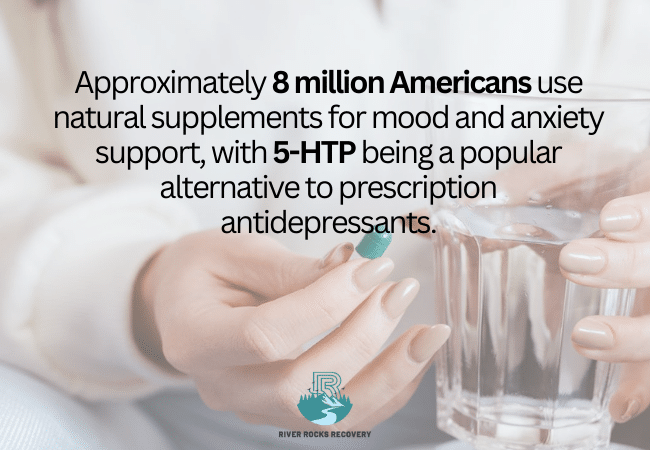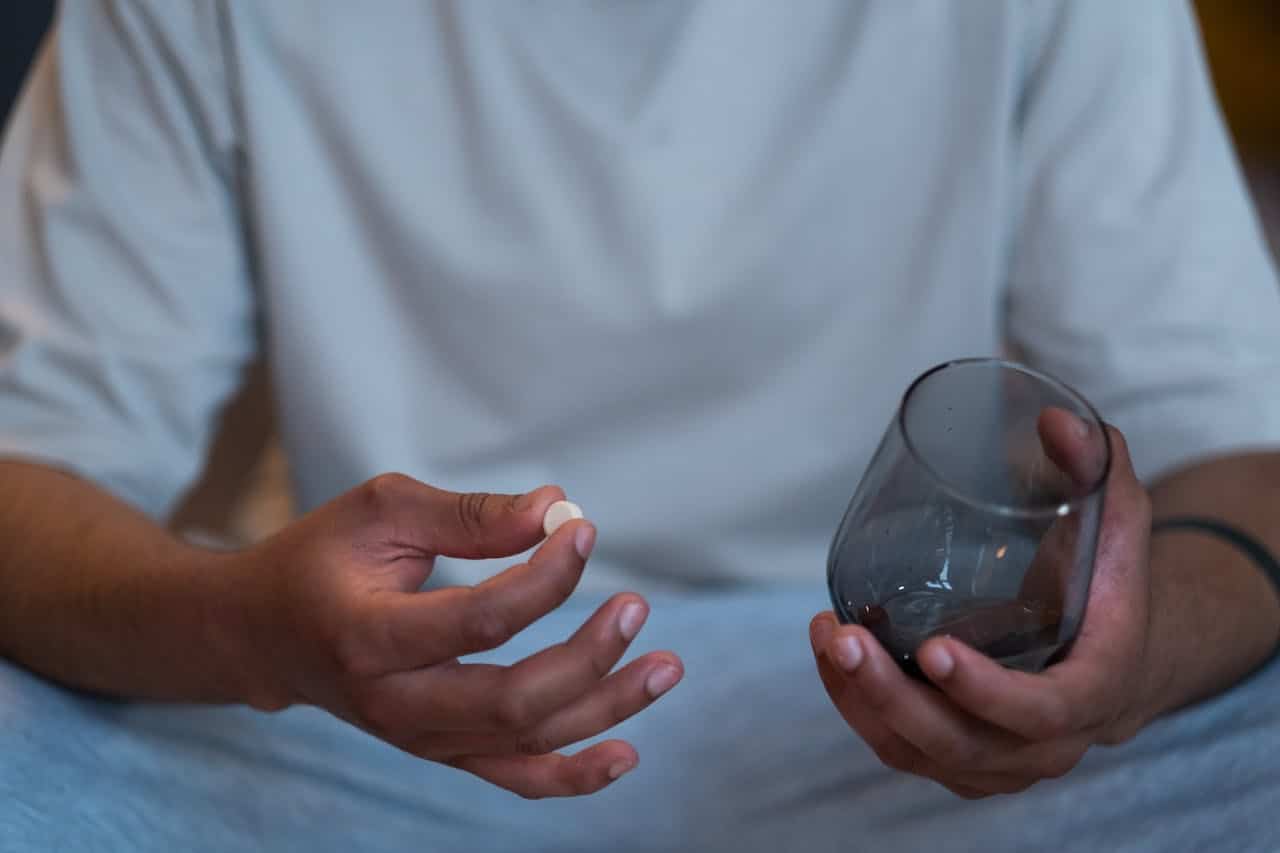5-HTP (5-Hydroxytryptophan) is a supplement made from the amino acid tryptophan, which aids in the production of serotonin, a neurotransmitter associated with mood, sleep, and hunger. It is commonly used as a natural treatment for mood disorders, insomnia, and anxiety.
However, when 5-HTP is mixed with alcohol, which similarly changes neurotransmitters and brain chemistry, concerns regarding its safety emerge. So, let’s jump into this blog and uncover how safe it can be.
How 5-HTP and Alcohol Affect the Brain
5-HTP increases serotonin levels in the brain, leading to feelings of serenity and well-being. Because it increases serotonin levels, it is frequently used as a natural medicine to treat poor mood and anxiety. Alcohol, on the other hand, influences neurotransmitters such as GABA, dopamine, and serotonin, initially producing feelings of relaxation but potentially reducing serotonin levels over time with repeated usage.
Many people take 5-HTP supplements to:
- Alleviate symptoms of depression and anxiety.
- Improve sleep quality.
- Support weight loss.
Combining these medications may have an unknown effect on brain chemistry, especially since both affect serotonin levels.
Risks of Combining 5-HTP with Alcohol
1. Serotonin Syndrome
One of the most dangerous side effects of mixing 5-HTP with alcohol is serotonin syndrome, which is produced by an excess of serotonin in the brain. Serotonin syndrome symptoms may include agitation, confusion, elevated heart rate, perspiration, muscle rigidity, and, in extreme cases, seizures or loss of consciousness. Because alcohol can modify serotonin levels, adding 5-HTP to the mix may raise the risk of serotonin overload, especially in persons who are also taking other serotonin-affecting drugs like antidepressants.
2. Increased Sedation and Impairment
Alcohol is a depressant that slows the central nervous system, resulting in decreased judgment, slower reaction times, and drowsiness. 5-HTP does not have sedative effects on its own, but when combined with alcohol, it may exacerbate the depressant properties of alcohol, potentially leading to increased drowsiness, decreased coordination, and diminished cognitive performance. This impact can be hazardous in situations that need alertness, such as driving or operating machinery.
3. Mood and Mental Health Effects
While 5-HTP is commonly used to improve mood, taking it with alcohol might cause unpredictable mood swings and disrupt emotional stability. Alcohol’s influence on mood varies greatly—it initially elevates mood but frequently causes melancholy or anxiety later on. For someone taking 5-HTP to treat mood disorders, alcohol may contradict its favorable benefits or create a loop in which the individual feels forced to drink to manage their mood, only to feel worse later on.
4. Potential Liver Strain
Both alcohol and 5-HTP are metabolized by the liver, and mixing them may put additional strain on this critical organ. Chronic or severe alcohol intake can cause liver damage, and while 5-HTP is not normally detrimental to the liver, combining it with alcohol can strain liver function, particularly in people with liver issues or who drink regularly.
Alcohol’s Effects on the Body and Mind
Alcohol is a central nervous system depressant that significantly impacts both the body and mind. When consumed, alcohol interferes with the brain’s neurotransmitter balance, affecting mood, judgment, and motor skills. Over time, excessive alcohol use can:
- Lower serotonin levels, worsening anxiety and depression.
- Disrupt sleep patterns, leading to insomnia and fatigue.
- Increase inflammation, impacting the heart, liver, and digestive system.
- Damage cognitive function, impairing memory and focus.
For individuals struggling with mental health issues or recovering from alcohol addiction, these effects can exacerbate existing challenges, making professional support essential.
Can 5-HTP and alcohol ever be used together?
While there has been limited research into the effects of mixing 5-HTP and alcohol, caution is typically suggested. Here are a few ideas to reduce potential risks:
- Avoid taking 5-HTP on the same day you drink.
- If you drink alcohol regularly, see your doctor before taking 5-HTP, especially if you are taking other medications or have any pre-existing health concerns.
- If you use 5-HTP to regulate your mood, limit your alcohol intake. Alcohol may offset the advantages of 5-HTP, therefore reducing consumption may improve the supplement’s effectiveness.

Why It’s Risky for Those in Recovery
For individuals recovering from alcohol addiction, combining 5-HTP with alcohol is particularly risky. Alcohol can trigger relapses and undermine the progress made in recovery programs such as Partial Hospitalization Programs, Intensive Outpatient Programs, and Outpatient Treatment Programs.
- Reignite cravings, making it harder to maintain sobriety.
- Exacerbate withdrawal symptoms, such as mood swings and sleep disturbances.
- Complicate co-occurring disorders, such as anxiety or depression, which are often treated with supplements like 5-HTP.
Additionally, those in recovery often use supplements like 5-HTP as part of their Mental Health Therapy to manage co-occurring conditions like anxiety or depression. Combining supplements with alcohol can complicate treatment and delay recovery.
Safe Alternatives for Mood and Sleep Support
For those seeking alternatives to 5-HTP and alcohol, consider the following strategies:
- Consult a Medical Professional: Before taking any supplement, discuss potential interactions with your healthcare provider.
- Engage in Holistic Therapies: Practices like mindfulness, yoga, and meditation can support mood and sleep without the need for supplements or alcohol.
- Explore Professional Mental Health Treatment: At River Rocks Recovery, we offer evidence-based Mental Health Treatment to address mood disorders and support overall wellness.
When to Seek Medical Advice
If you’re taking 5-HTP and considering alcohol consumption, or if you experience any concerning symptoms, it’s important to consult a healthcare provider. Seek immediate medical attention if you experience:
- Severe chest pain or shortness of breath.
- Confusion, agitation, or unusual mood changes.
- Persistent nausea, vomiting, or dizziness.
- Symptoms of serotonin syndrome, such as rapid heartbeat or high fever.
At River Rocks Recovery, we encourage individuals to prioritize their health and well-being by seeking professional guidance. Whether you need support through a Mental Health Treatment Program, Alcohol Addiction Treatment, or a Comprehensive Outpatient Program, we’re here to help.
Need Professional Help? Call River Rocks Recovery!
River Rocks Recovery devoted team provides tailored and compassionate care to help you on your path to recovery. From thorough treatment plans to a supportive environment, we offer the direction and resources you need to live a better, substance-free life. Contact River Rocks Recovery immediately and let us guide you to a happier, healthier future.




























